《乡愁》英译赏析
《乡愁》中英版及赏析
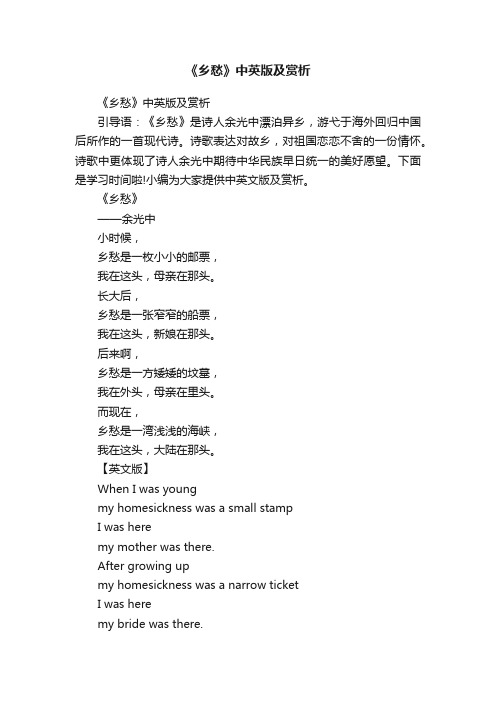
《乡愁》中英版及赏析《乡愁》中英版及赏析引导语:《乡愁》是诗人余光中漂泊异乡,游弋于海外回归中国后所作的一首现代诗。
诗歌表达对故乡,对祖国恋恋不舍的一份情怀。
诗歌中更体现了诗人余光中期待中华民族早日统一的美好愿望。
下面是学习时间啦!小编为大家提供中英文版及赏析。
《乡愁》——余光中小时候,乡愁是一枚小小的邮票,我在这头,母亲在那头。
长大后,乡愁是一张窄窄的船票,我在这头,新娘在那头。
后来啊,乡愁是一方矮矮的坟墓,我在外头,母亲在里头。
而现在,乡愁是一湾浅浅的海峡,我在这头,大陆在那头。
【英文版】When I was youngmy homesickness was a small stampI was heremy mother was there.After growing upmy homesickness was a narrow ticketI was heremy bride was there.Latermy homesickness was a little tombI was outsidemy mother was inside.And nowmy homesickness is a shallow straitI am herethe mainland is there.【赏析】余光中,台湾著名诗人,1928年生于南京,现任高雄中山大学文学院院长。
余光中将自己浓浓的思乡之情,倾注在他的诗作之中,《乡愁》便是一首代表作。
阅读此诗,首先呈现给读者的是四幅鲜明而又具体的生活画面。
第一小节:幼年求学,母子分离,借书信以慰别情。
第二小节:成年后,告别新婚妻子,离乡背井,天各一方。
第三小节:生离死别,母子不得相见。
第四小节:同胞难得相聚,国家不能统一。
同时,读者可以感受到作者浓郁而又强烈的感情,诗人的乡思之愁不是直白地说出来的,而是通过联想、想象,塑造了四幅生活艺术形象,使之呈现在读者眼前。
《乡愁》两个英译本的对比分析
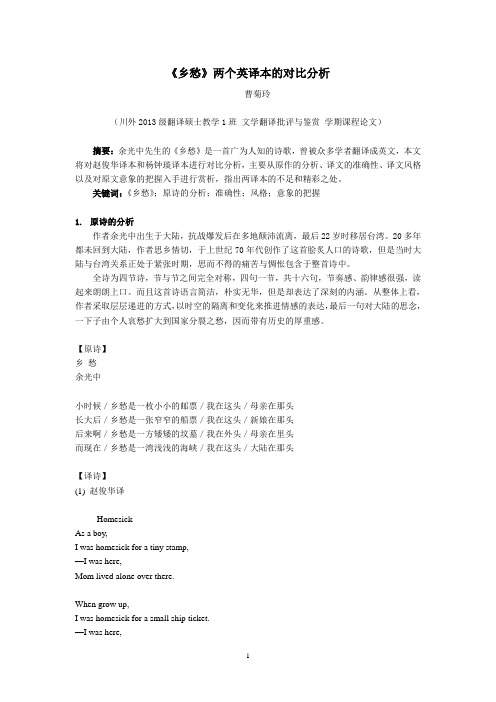
《乡愁》两个英译本的对比分析曹菊玲(川外2013级翻译硕士教学1班文学翻译批评与鉴赏学期课程论文)摘要:余光中先生的《乡愁》是一首广为人知的诗歌,曾被众多学者翻译成英文,本文将对赵俊华译本和杨钟琰译本进行对比分析,主要从原作的分析、译文的准确性、译文风格以及对原文意象的把握入手进行赏析,指出两译本的不足和精彩之处。
关键词:《乡愁》;原诗的分析;准确性;风格;意象的把握1.原诗的分析作者余光中出生于大陆,抗战爆发后在多地颠沛流离,最后22岁时移居台湾。
20多年都未回到大陆,作者思乡情切,于上世纪70年代创作了这首脍炙人口的诗歌,但是当时大陆与台湾关系正处于紧张时期,思而不得的痛苦与惆怅包含于整首诗中。
全诗为四节诗,节与节之间完全对称,四句一节,共十六句,节奏感、韵律感很强,读起来朗朗上口。
而且这首诗语言简洁,朴实无华,但是却表达了深刻的内涵。
从整体上看,作者采取层层递进的方式,以时空的隔离和变化来推进情感的表达,最后一句对大陆的思念,一下子由个人哀愁扩大到国家分裂之愁,因而带有历史的厚重感。
【原诗】乡愁余光中小时候/乡愁是一枚小小的邮票/我在这头/母亲在那头长大后/乡愁是一张窄窄的船票/我在这头/新娘在那头后来啊/乡愁是一方矮矮的坟墓/我在外头/母亲在里头而现在/乡愁是一湾浅浅的海峡/我在这头/大陆在那头【译诗】(1) 赵俊华译HomesickAs a boy,I was homesick for a tiny stamp,—I was here,Mom lived alone over there.When grow up,I was homesick for a small ship ticket.—I was here,My bride remained over there.Later on,I was homesick for a little tomb.—I was here,Mother rested over there.And to-day,I am homesick for a shallow strait,—I am here,The Mainland lies over there.(2)杨钟琰译NostalgiaWhen I was a child,Nostalgia seemed a small stamp:"Here am Iand there my mother."Then I was a grown-up,Nostalgia became a traveling ticket:"Here am IAnd there my bride."During the later yearsNostalgia turned to be a graveyard:"Here am IAnd yonder my mother."And now at presentNostalgia looms large to be a channel:"Here am Iand yonder my Continent!"2 准确性一直以来,翻译界对严复“信、达、雅”翻译的标准是比较推崇的。
席慕容《乡愁》中英版
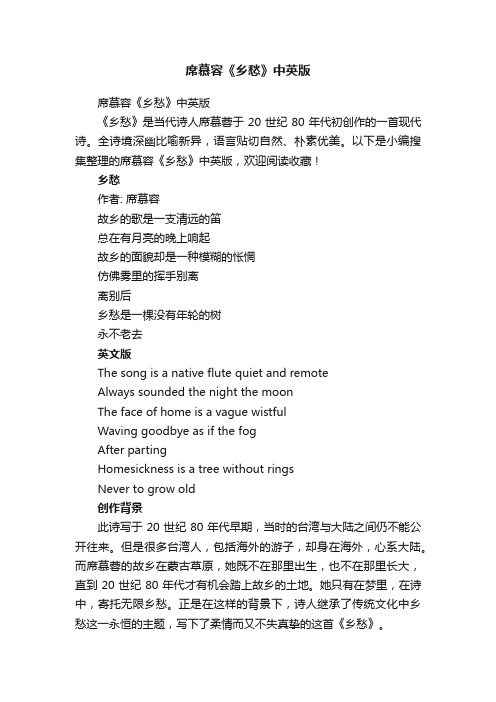
席慕容《乡愁》中英版席慕容《乡愁》中英版《乡愁》是当代诗人席慕蓉于20世纪80年代初创作的一首现代诗。
全诗境深幽比喻新异,语言贴切自然、朴素优美。
以下是小编搜集整理的席慕容《乡愁》中英版,欢迎阅读收藏!乡愁作者: 席慕容故乡的歌是一支清远的笛总在有月亮的晚上响起故乡的面貌却是一种模糊的怅惘仿佛雾里的挥手别离离别后乡愁是一棵没有年轮的树永不老去英文版The song is a native flute quiet and remoteAlways sounded the night the moonThe face of home is a vague wistfulWaving goodbye as if the fogAfter partingHomesickness is a tree without ringsNever to grow old创作背景此诗写于20世纪80年代早期,当时的台湾与大陆之间仍不能公开往来。
但是很多台湾人,包括海外的游子,却身在海外,心系大陆。
而席慕蓉的故乡在蒙古草原,她既不在那里出生,也不在那里长大,直到20世纪80年代才有机会踏上故乡的土地。
她只有在梦里,在诗中,寄托无限乡愁。
正是在这样的背景下,诗人继承了传统文化中乡愁这一永恒的主题,写下了柔情而又不失真挚的这首《乡愁》。
文学赏析写乡愁的诗很多,而席慕蓉的这首《乡愁》写得清爽缠绵,清爽缠绵中又透着淳厚。
远离家乡的人时常思念家乡,思念亲人正像思念中的亲人的音容最容易出现在眼前一样,故乡的声音、故乡的容貌时时萦绕在游子的脑际。
诗人将诗意赋予这种最普通也是最深切的思念。
诗中写故乡的声音是清远的笛音,总在有月亮的晚上响起。
月是故乡明。
在古诗月夜思乡的意象中增添了牵魂摄魄的清丽悠远的笛音。
与清远的乡音形成鲜明的对比,故乡的容貌“却是一种模糊的惆怅”。
这正是诗人对人们情感的准确把握,其实我们都有这样的'体会,愈是熟悉的、了解的、亲近的,往往愈不容易一下子说出其容貌来。
浅析《乡愁》英译文中的翻译理论

称 。 原 作 中 “ 时 候 ” “ 大后 ” 未 出现 谓 语 动 词 , 在英 语 小 、长 也 这 中 不 可 能构 成 规 范 的 句式 。 因 为英 语 的 主语 功 能 一般 都 要 充 当 谓 语 动 词 V( 事 行 为 ) 施 的动 作 发 出 者 ( 事 者 ) 因 为 “ … 施 , … 英 语 是 ‘ 行 ’ , 语 句 法 都 恪 守 以S 做 主 轴 的形 式 程 式 原 重 的 英 V 则” 。所 以译 文 中前 两 节 的第 一 句 出 现 了主 语 “” 谓 语 “ a , I, wg
二 、 作分 析 译
在 译 作 中 的每 小 节 的后 两行 中 ,第 一 行 都 出现 了w s最 a, 后 一 行 都 用 连 词 (n hc ) 连 接且 都 省 略 了 助动 词 w s例 a i 来 h a, 如 :A d.u u w sMo i ie , 它 三 节 的 末 行 中 省 略 比 “ n , t p( a) r n d ” 其 h n s 较 明显 “w sss y g a i / ig 。 行 的 助 动词 的省 略 是 ( a] ) al / in l n ” 末 i t n w tgy 为 了避 免 重 复 , 助 于 语 言 结 构 的适 度优 化 。 谓 “ 度 ” 与 有 所 适 指 源 语 的灵 活 对 应 , 时 也 有 助 于 与接 受 者 的审 美 参 与 。 同 ( ) 感 分 析 二 情 英 译 文 中 前 三 节 的 第 二 行 开 头 均 以w e 开 始 来 抒 发 作 者 hn 的思 乡 之 情 , 而最 后 一 节 以 “ 开 始 。译 者 此 处 是 在 深 切 地 感 0” 受作 者 的感 情 之 后 的 感 慨 。作 者 在 谈 及 本 文 时 说 : 时 候 小 , 小 寄 宿学 校 , 与妈 妈 写 信 ; 后 赴 美 读 书 , 轮 船 返 台 ; 来 母 要 婚 坐 后 亲去 世 , 失母 爱 ; 三 句 思念 的都 是 女 性 。 永 前 到最 后 一 句 , 想 我 到大 陆这 个 “ 大母 亲 ” 于是 意 境 和 思 路便 豁然 开 朗 。 者 在 深 , 译 切感 受 : 者 因 时 间 的 推 移 和 空 间 的 转 换 , 发 深 深 的思 乡之 作 抒 情 时 , 到 由 于 特 殊 的政 治 原 因 , 陆 和 台湾 长 期 阻 隔 . 己 想 大 自
“传神”翻译标准视域下的八种《乡愁》英译赏析

“传神”翻译标准视域下的八种《乡愁》英译赏析张如莹,刘绍忠(桂林电子科技大学外国语学院,广西桂林541004)一、引言《乡愁》[1]是台湾诗人余光中(1928—2017)漂泊异乡,从海外回到中国后所作的一首现代诗。
生活的奔波让人疲惫不堪,与亲朋故友的一次次聚散离合,使得诗人常生伤情和感叹。
1971年,阔别故土20多年的余光中,就是在极度思乡的心境下,写下了这首满怀深情、深受华夏儿女挚爱的诗。
诗人将“乡愁”描写得淋漓尽致,表达出作者对故乡和亲人,对祖国深深的眷恋之情,更体现了诗人对中华民族早日统一的美好心愿。
诗人赋予了诗歌美的意境和生命,不仅赢得了读者,也引来了诸多翻译工作者的跃跃欲试,努力地要拿出此诗的上好译作来。
近年来就出现了此诗的多种英译版本。
文章的讨论涉及《乡愁》流传在网络和媒体上的八个不同的英译本,主要以傅雷的翻译“传神”论[2]视角,从措词和句式选用两个层面来剖析译本之间的倾向及其达到的效果。
二、“传神”及其他文学翻译标准说文学翻译是翻译领域中的重要组成部分[3][4],恐怕是很少有人会持反对意见的。
可是,要问究竟文学翻译的标准是什么,这却是比较有争议的。
可以说,直至今天,还没有一个令大家一致认可的文学翻译标准。
不过,经过反复比较,学者们似乎倾向于比较经典的结论,像严复(1854—1921)的“雅”[5][6],钱钟书(1910—1998)的“化”[7],以及傅雷(1908—1966)的“传神”[2]等,认为它们比较有说服力[8][9][10][11][12]。
“雅”,是严复翻译三标准“信达雅”之一。
其中,“信是最基本的,指译者要如实表达原文之意,即忠实于原文;达是对译文行文的主要要求,指译文应该通顺;雅即译文的典雅或译文要有文采。
”[6]对“雅”标准的推崇者,自然众多而难以一一罗列;“雅”之于文学翻译的重要性更是不言而喻,为大家所熟悉,无须举例。
所谓“化”,指信雅兼具。
这是钱钟书关于翻译的标准。
《乡愁》两个英译本的对比分析

《乡愁》两个英译本的对比分析曹菊玲(川外2013级翻译硕士教学1班文学翻译批评与鉴赏学期课程论文)摘要:余光中先生的《乡愁》是一首广为人知的诗歌,曾被众多学者翻译成英文,本文将对赵俊华译本和杨钟琰译本进行对比分析,主要从原作的分析、译文的准确性、译文风格以及对原文意象的把握入手进行赏析,指出两译本的不足和精彩之处。
关键词:《乡愁》;原诗的分析;准确性;风格;意象的把握1.原诗的分析作者余光中出生于大陆,抗战爆发后在多地颠沛流离,最后22岁时移居台湾。
20多年都未回到大陆,作者思乡情切,于上世纪70年代创作了这首脍炙人口的诗歌,但是当时大陆与台湾关系正处于紧张时期,思而不得的痛苦与惆怅包含于整首诗中。
全诗为四节诗,节与节之间完全对称,四句一节,共十六句,节奏感、韵律感很强,读起来朗朗上口。
而且这首诗语言简洁,朴实无华,但是却表达了深刻的内涵。
从整体上看,作者采取层层递进的方式,以时空的隔离和变化来推进情感的表达,最后一句对大陆的思念,一下子由个人哀愁扩大到国家分裂之愁,因而带有历史的厚重感。
【原诗】乡愁余光中小时候/乡愁是一枚小小的邮票/我在这头/母亲在那头长大后/乡愁是一张窄窄的船票/我在这头/新娘在那头后来啊/乡愁是一方矮矮的坟墓/我在外头/母亲在里头而现在/乡愁是一湾浅浅的海峡/我在这头/大陆在那头【译诗】(1) 赵俊华译HomesickAs a boy,I was homesick for a tiny stamp,—I was here,Mom lived alone over there.When grow up,I was homesick for a small ship ticket.—I was here,My bride remained over there.Later on,I was homesick for a little tomb.—I was here,Mother rested over there.And to-day,I am homesick for a shallow strait,—I am here,The Mainland lies over there.(2)杨钟琰译NostalgiaWhen I was a child,Nostalgia seemed a small stamp:"Here am Iand there my mother."Then I was a grown-up,Nostalgia became a traveling ticket:"Here am IAnd there my bride."During the later yearsNostalgia turned to be a graveyard:"Here am IAnd yonder my mother."And now at presentNostalgia looms large to be a channel:"Here am Iand yonder my Continent!"2 准确性一直以来,翻译界对严复“信、达、雅”翻译的标准是比较推崇的。
《乡愁》英译文本比较研究

《乡愁》英译文本比较研究作者:王进来源:《中国校外教育·高教(下旬)》2014年第14期摘要:《乡愁》是一首风格典丽的现代诗。
余光中先生以朴素、简明、隽永的语言和高超的艺术技巧,表达了台湾人民盼望海峡两岸统一的愿望,抒发了作者浓郁的思乡之情。
以《乡愁》的5个英文译作为例,分析研究了不同译作在选词、意象、韵律和风格上的不同给读者带来的形音意差异的感受。
关键词:乡愁选词意象韵律风格美国诗人Robert Frost有一句名言:Poetry is what is lost in translation(诗者,译之所失也),不管这句话是多么极端,它还是道出了诗歌翻译的难处。
中文诗歌更因其语言凝练、节奏性强、意象丰富而成为翻译的通天塔。
尽管艰难,还是有很多热衷于翻译的文学家努力探索,试图将中诗这一璀璨明珠送出国门。
众所周知,所有翻译的前奏都是理解,而诗歌的理解更需多揣摩推敲、审词琢句,以期磨刀不负砍柴工,因为理解的深度和广度都会为后面的译作再现产生差异。
本文将以台湾余光中先生脍炙人口的作品《乡愁》的5个不同译本为例来分析和品评不同译本的差异。
《乡愁》是一首风格典丽的现代诗。
余光中先生以朴素、简明、隽永的语言和高超的艺术技巧,表达了台湾人民盼望海峡两岸统一的愿望,抒发了作者浓郁的思乡之情。
诗人通过意象把抽象的乡愁具体化,给读者呈现了四幅鲜明而又具体的生活画面。
第一小节:幼年求学,母子分离,借书信以慰别情;第二小节:成年后,告别新婚妻子,离乡背井,天各一方;第三小节:母亲去世,从此阴阳两隔,生死两茫茫;第四小节:同胞难得相聚,国家不能统一。
通过这些不枝不蔓的意象、幽远深邃的意境、丰富含蓄的内容,诗人低回掩抑、如怨如述把对母亲、妻子、祖国的思念、眷念之情展现出来,让人回味无穷。
译文1:陈文伯译When I was a child/my homesick was a small stamp/ Linking Mum at the other end /And me this.When I grew up/I remained homesick/but it became a ticket/by which I sailed to and from my bride at the other end.Then/homesickness took the shape of the grave/Mum inside of it/and me outside.Now I'm still homesick/but it is a narrow strait/ Separating me on this side/and the mainland on the other.译文2:杨种琰译When I was a child/Nostalgia seemed a small stamp/:“Here am I/ and there my mother.”Then I was a grown-up/Nostalgia became a traveling ticket/:“Here am I/and there my bride.”During the later years/Nostalgia turned to be a graveyard/:“Here am I/and yonder my mother.”And now at present/Nostalgia looms large to be a channel/:“Here am I/and yonder my Continent!”譯文3:赵俊华译As a boy /I was homesick for a tiny stamp/ I was here/Mom lived alone over there.When grown up/I was homesick for a small ship ticket/ I was here/ My bride remained over there.Later on/ I was homesick for a little tomb/ I was there/ Mother rested over there.And to-day/ I am homesick for a shallow strait/ I am here/ The Mainland lies over there.译文4:张智中译When I was a child/ Nostalgia is a tiny stamp/I am hither/And Mother is thitherWhen I become an adult/Nostalgia is a slip of boat ticket/I am hither/And bride is thitherLater on/Nostalgia is a short tomb/I am without/And Mother is withinBut now/Nostalgia is a shallow strait/I am hither/And the mainland is thither译文5:余光中译When I was young/Nostalgia was a tiny stamp/Me on this side/Mother was on the other side.When I grew up/Nostalgia was a narrow boat ticket/Me on this side/Bride on the other side.But later on/Nostalgia was a low,lowgrave/Me on the outside/Mother on the inside.And at present/Nostalgia becomes a shallow strait/Me on this side/Mainland on the other side.一、选词“乡愁”的翻译,有两个译本译为“homesick”,其余两个版本为“nostalgia”。
余光中《乡愁》及其英译文的主位分析
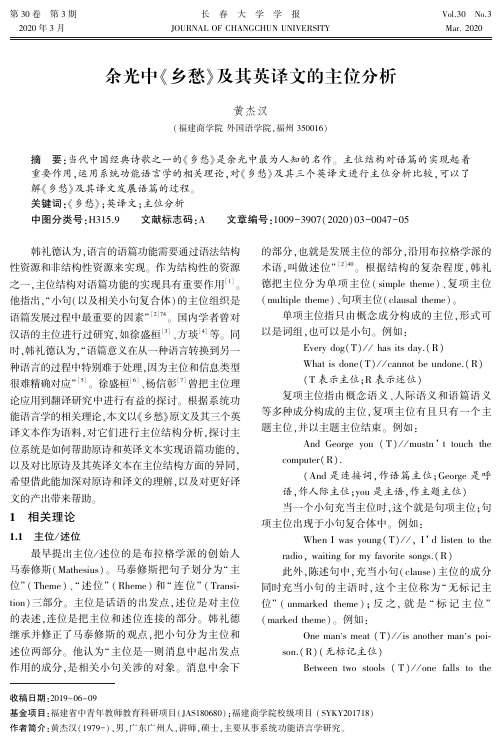
1 相关理论
1.1 主位 / 述位
最早提出主位 / 述位的是布拉格学派的创始人
马泰修斯( Mathesius) ꎮ 马泰修斯把句子划分为“ 主
题主位ꎬ并以主题主位结束ꎮ 例如:
And George you ( T) / / mustn ’ t touch the
computer( R) .
重要作用ꎬ运用系统功能语言学的相关理论ꎬ对« 乡愁» 及其三个英译文进行主位分析比较ꎬ可以了
解« 乡愁» 及其译文发展语篇的过程ꎮ
关键词:« 乡愁» ꎻ英译文ꎻ主位分析
中图分类号:H315.9 文献标志码:A 文章编号:1009 - 3907(2020)03 - 0047 - 05
韩礼德认为ꎬ语言的语篇功能需要通过语法结构
长 春 大 学 学 报 第 30 卷
48
ground.( R) ( 标记主位)
众多翻译 人 士 的 关 注ꎬ有 多 个 英 语 译 文ꎮ 我 们 作
主位的选择构成了语篇的发展方式ꎬ自从但奈什
ley 以及许景城翻译ꎮ 我们的选择是基于以下原因
( And 是连接词ꎬ作语篇主位ꎻGeorge 是呼
语ꎬ作人际主位ꎻyou 是主语ꎬ作主题主位)
当一个小句充当主位时ꎬ这个就是句项主位ꎻ句
项主位出现于小句复合体中ꎮ 例如:
When I was young( T) / / ꎬ I’ d listen to the
radioꎬ waiting for my favorite songs.( R)
年轻学者ꎮ 下面以 « 乡 愁» 原 文、余 光 中 本 人 的 译
文、Rewi Alley 的译文以及许景城的译文为语料 ②ꎬ
进行主位分析ꎮ
基于许渊冲“三美论”诗歌翻译探析——以《乡愁》三个英译本为例
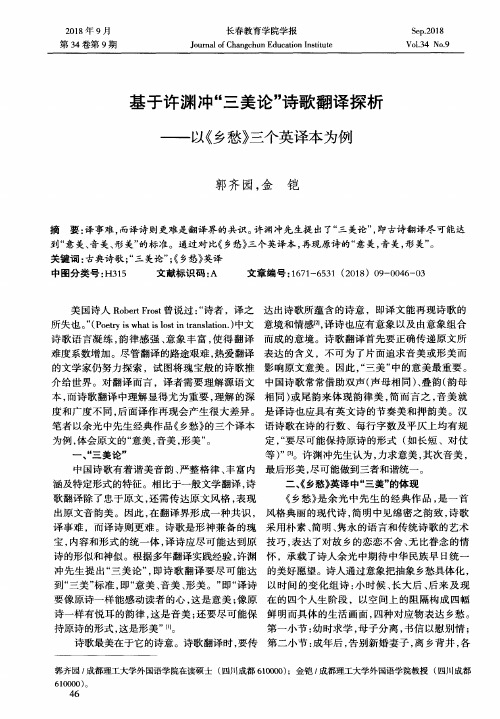
涵及特定形式的特征 。相 比于一般文学翻译 ,诗 二、《乡愁》英译中“三美”的体现
歌翻译 除了忠于原文 ,还需传达原 文风格 ,表现 《乡愁 》是余 光 中先生的经典作 品 ,是一首
出原 文 音 韵 美 。 因此 ,在 翻译 界形 成 一种 共 识 , 风 格 典 丽 的 现代 诗 ,简 明 中见 绵 密 之 韵 致 ,诗 歌
美 国诗人 Robe ̄Frost曾说 过 :“诗 者 ,译 之 达 出诗歌所蕴含的诗意 ,即译 文能再现诗歌 的
所 失也 。”(Poetry is what is lost in translation.)中文 意境 和情感[21,译诗也应有 意象 以及 由意象组合
诗歌语 言凝练 ,韵律感强 、意象 丰富 ,使得 翻译 而成的意境 。诗歌翻译首先要 正确传递原文所
阳两隔 ,坟墓 以慰别情 ;第 四小节 :游子漂泊 ,国 故乡的眷念也随之厚重 。
家 统 一 ,海 峡 以慰 爱 国情 怀 。邮票 、船 票 、坟 墓 、 诗 歌 中 ,“这 头 ”和 “那 头 ”相 较 于余 译 的平 铺
海峡 ,精炼而单纯的四个意象 ,全然无堆砌而蓄 直叙 ,以下译本传达 出原诗 的内涵意义 。赵译
诗一样有悦耳的韵律 ,这是音美 ;还要尽可能保 鲜 明而具体的生活画面 ,四种对应物表 达乡愁 。
持原 诗 的形 式 ,这是 形 美 ”[1l。
第一小节 :幼 时求学 ,母子分离 ,书信 以慰 别情 ;
诗歌最美在于它 的诗意 。诗歌翻译时 ,要传 第 -d'节 :成 年后 ,告 别新 婚 妻子 ,离 乡 背 井 ,各
为例 ,体会 原 文 的 “意美 ,音 美 ,形美 ”。
定 ,“要尽可能保持原诗 的形式 (如长短 、对仗
乡愁英语赏析作文
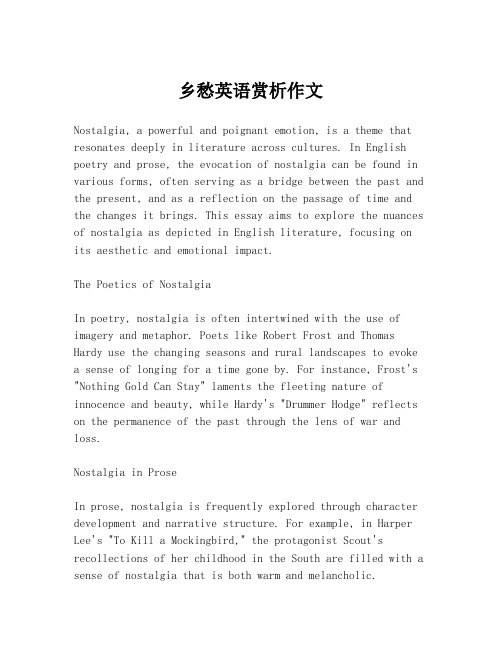
乡愁英语赏析作文Nostalgia, a powerful and poignant emotion, is a theme that resonates deeply in literature across cultures. In English poetry and prose, the evocation of nostalgia can be found in various forms, often serving as a bridge between the past and the present, and as a reflection on the passage of time and the changes it brings. This essay aims to explore the nuances of nostalgia as depicted in English literature, focusing on its aesthetic and emotional impact.The Poetics of NostalgiaIn poetry, nostalgia is often intertwined with the use of imagery and metaphor. Poets like Robert Frost and Thomas Hardy use the changing seasons and rural landscapes to evoke a sense of longing for a time gone by. For instance, Frost's "Nothing Gold Can Stay" laments the fleeting nature of innocence and beauty, while Hardy's "Drummer Hodge" reflects on the permanence of the past through the lens of war and loss.Nostalgia in ProseIn prose, nostalgia is frequently explored through character development and narrative structure. For example, in Harper Lee's "To Kill a Mockingbird," the protagonist Scout's recollections of her childhood in the South are filled with a sense of nostalgia that is both warm and melancholic.Similarly, Charles Dickens' "A Christmas Carol" uses the device of revisiting the past to evoke a sense of nostalgia that is central to the story's theme of redemption.The Role of LanguageThe language used to convey nostalgia is often rich with sensory details and emotional resonance. Words that describe scents, sounds, and tactile sensations can transport readers back to a different time, allowing them to experience the character's feelings of nostalgia. The use of dialect, idiom, and period-specific vocabulary can also serve to ground the narrative in a particular time and place, enhancing the sense of nostalgia.Cultural and Personal NostalgiaNostalgia in literature can be both cultural and personal. Cultural nostalgia might refer to a collective past, such as the idealization of a simpler time in history, while personal nostalgia is more intimate, relating to individual memories and experiences. Works like J.D. Salinger's "The Catcher in the Rye" tap into personal nostalgia, as the reader follows the protagonist's internal monologue and memories.The Emotional Spectrum of NostalgiaNostalgia is not always a pleasant emotion; it can be bittersweet or even painful. It can represent a yearning for something that can never be recaptured or a recognition of loss. In literature, this can be seen in the way charactersgrapple with their past, as in Tim O'Brien's "The Things They Carried," where the characters carry the weight of their memories from the Vietnam War.ConclusionNostalgia in English literature is a complex and multifaceted theme that serves to connect readers with the characters' inner lives and the broader human experience. It is a device that can enrich a narrative, providing depth and emotional resonance. Through careful examination of the language, imagery, and narrative techniques used to convey nostalgia, we can appreciate the artistry and impact of this timeless theme in English literature.。
英语版的乡愁诗歌

英语版的乡愁诗歌英语版的乡愁诗歌 《乡愁》是诗⼈余光中漂泊异乡,游⼷于海外回归中国后所作的⼀⾸现代诗。
⼀起来看看英语版的乡愁,仅供⼤家参考!谢谢! Nostalgia -----by 余光中 When I was a child, Nostalgia seemed a small stamp: "Here am I And there ……my mother." Then I was a grown-up, Nostalgia became a traveling ticket: "Here am I And there……my bride." During the later years, Nostalgia turned to be a graveyard: "Here am I And yonder……my mother." And now at present, Nostalgia looms large to be a channel: "Here am I And yonder……my Continent!" 当余光中的乡愁遇到古代诗词 乡愁 ——余光中 ⼩时候, 乡愁是⼀枚⼩⼩的邮票, 我在这头,母亲在那头。
长⼤后, 乡愁是⼀张窄窄的船票, 我在这头,新娘在那头。
后来啊, 乡愁是⼀⽅矮矮的坟墓, 我在外头,母亲在⾥头。
⽽现在, 乡愁是⼀湾浅浅的海峡, 我在这头,⼤陆在那头。
边城思 南北朝-何逊 柳黄未吐叶,⽔绿半含苔。
春⾊边城动,客思故乡来。
此诗描写了秋⽇夜晚,诗⼈于屋内抬头望⽉的所感。
诗中运⽤⽐喻、衬托等⼿法,表达客居思乡之情,语⾔清新朴素⽽韵味含蓄⽆穷,历来⼴为传诵。
静夜思 唐-李⽩ 床前明⽉光,疑是地上霜。
举头望明⽉,低头思故乡。
此诗描写了秋⽇夜晚,诗⼈于屋内抬头望⽉的所感。
诗中运⽤⽐喻、衬托等⼿法,表达客居思乡之情,语⾔清新朴素⽽韵味含蓄⽆穷,历来⼴为传诵。
《乡愁》英译

What’s your translation?
• • • • 小时候/乡愁是一枚小小的邮票/我在这头/母亲在那头 长大后/乡愁是一张窄窄的船票/我在这头/新娘在那头 后来啊/乡愁是一方矮矮的坟墓/我在外头/母亲在里头 而现在/乡愁是一湾浅浅的海峡/我在这头/大陆在那头
?
• • • • •
原文: 小时候/乡愁是一枚小小的邮票/我在这头/母亲在那头 长大后/乡愁是一张窄窄的船票/我在这头/新娘在那头 后来啊/乡愁是一方矮矮的坟墓/我在外头/母亲在里头 而现在/乡愁是一湾浅浅的海峡/我在这头/大陆在那头
• • • • • • • • • • •
And there my bride." During the later years Nostalgia turned to be a graveyard: "Here am I And yonder my mother." And now at present Nostalgia looms large to be a channel: "Here am I and yonder my Continent!"
• • • • • • • • • • •
Nostalgia (杨钟琰译) When I was a child, Nostalgia seemed a small stamp: "Here am I and there my mother." Then I was a grown-up, Nostalgia became a traveling ticket: "Here am I
析:这一版与前一版的区别首先是将“乡愁”译为了“nostalgia”,而非“homesick”。“乡愁”译 为“homesick”没有问题。Nostalgia这个词与homesick有些区别,前者指较为强烈、 甚至影响健康的思乡之情,同时,nostalgia比homesick的含义更广泛,渴求的不仅 仅是家乡,同时渴求的色彩也更加强烈一些,浪漫色彩更浓一些。因此,文学色彩 更浓的nostalgia似乎比homesick更适合翻译这里的“乡愁”二字。
余光中 乡愁 英译

余光中乡愁英译(实用版)编制人:__________________审核人:__________________审批人:__________________编制单位:__________________编制时间:____年____月____日序言下载提示:该文档是本店铺精心编制而成的,希望大家下载后,能够帮助大家解决实际问题。
文档下载后可定制修改,请根据实际需要进行调整和使用,谢谢!并且,本店铺为大家提供各种类型的经典范文,如教学教案、阅读试题、诗歌鉴赏、教学随笔、日记散文、语录句子、报告总结、故事大全、作文大全、其他范文等等,想了解不同范文格式和写法,敬请关注!Download tips: This document is carefully compiled by this editor.I hope that after you download it, it can help you solve practical problems. The document can be customized and modified after downloading, please adjust and use it according to actual needs, thank you!In addition, this shop provides you with various types of classic sample essays, such as teaching lesson plans, reading questions, poetry appreciation, teaching essays, diary essays, quotations sentences, report summaries, stories, essays, other essays, etc. If you want to know the difference Please pay attention to the format and writing of the sample essay!余光中乡愁英译余光中乡愁英译余光中《乡愁》英译是怎样的呢?余光中《乡愁》是一篇家喻户晓的佳作,在国内外都享有很高的声誉。
- 1、下载文档前请自行甄别文档内容的完整性,平台不提供额外的编辑、内容补充、找答案等附加服务。
- 2、"仅部分预览"的文档,不可在线预览部分如存在完整性等问题,可反馈申请退款(可完整预览的文档不适用该条件!)。
- 3、如文档侵犯您的权益,请联系客服反馈,我们会尽快为您处理(人工客服工作时间:9:00-18:30)。
《乡愁》英译赏析
《乡愁》是余光中先生现代诗的代表作之一,该诗将乡愁描绘得淋漓尽致。
余光中先生为福建永春人,后旅居台湾。
他被誉为“左手诗歌,右手散文”,是个能诗能文的大家。
读余先生的文字有一种清新扑面的感觉。
《乡愁》的英文版也是余光中先生。
该译本用浅显通俗的语言将原文的韵味用英文表达出来,给读者美的享受。
英语语言简单直白,掌握这种语言风格对更好地理解英文有着重要的作用。
你也可以尝试翻译现代诗,或许可以更深刻地体会英汉这两种语言语言风格的差异。
Nostalgia
Translated by Yu Guangzhong
When I was young,
Nostalgia was a tiny, tiny stamp,
Me on this side,
Mother on the other side.
When I grew up,
Nostalgia was a narrow boat ticket,
Me on this side,
My bride on the other side.
But later on,
Nostalgia was a lowly grave,
Me on the outside,
Mother on the inside.
And at present,
Nostalgia becomes a shallow strait,
Me on this side,
Mainland on the other side.
乡愁
余光中
小时候
乡愁是一枚小小的邮票
我在这头
母亲在那头
长大后
乡愁是一张窄窄的船票
我在这头
新娘在那头
后来啊
乡愁是一方矮矮的坟墓我在外头
母亲在里头
而现在
乡愁是一湾浅浅的海峡我在这头
大陆在那头。
